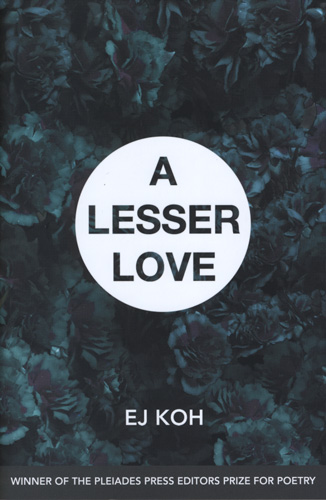A Lesser Love
If I can own anyone
I ask for noneunlike orchids that cannot
grow unless paired.I don’t know.
I remember you lovedto swim. Everything I am
become water
—“Madrona”
If I can own anyone
I ask for noneunlike orchids that cannot
grow unless paired.I don’t know.
I remember you lovedto swim. Everything I am
become water
—“Madrona”
It is clear why EJ Koh’s A Lesser Love was selected as The Pleiades Press Editors Prize for Poetry in 2017. It is clear that each page stands alone as an example of true contemporary poetry. It is clear you should buy this book, memorize all the poems, then give it to a friend who need to be affirmed that poetry is far from dead.
Formal and tightly crafted, each poem has at least one zinger: “We must enact what it means to live off one another.” “I am sick in my own way.” “Don’t leave me, the wind said, unwed.” “No one knows why she weeps as bright as memory.” The only critique I have of this work, as a fellow poet, is why the hell can’t I write this good. But seriously, this book is a keeper.
The collection is structured in three acts: 1) Heaven, 2) War, and 3) Love. The first poem “Showtime” acts as a prologue:
Even if I shame myself,
Please be kind to me.In the mirror, it mean:
Even inside my greatcoatof conscience, drunk and white,
please be kind to me.
A lovely incantation, almost Shakespearean, to an audience that will see a soul bared, a heart opened, flesh exposed, and love explored. Thematically, the first section “Heaven” is a coming-of-age collage; many of the stanzas dive into parental choices, struggles, histories. “The Present is a revenge of the past” is the volta of an eleven-line poem without a syllable out of place titled, “Father In His Old Age.” The second section, is tougher love, covering more violent themes: forced sex work, espionage, the Korean war, immigration, and body politics. Beyoncé, tiger balm, the CIA, the pledge of allegiance, an evidence of genocide, all weave together to turn the pages forward. There is no direct narrative, but a circumnavigation of subject matter brings coherence. The final section “Love” feels more mature, more meditative, as if in the stillness after an intense journey, reflection brings peace. The last stanza of “Happy,” the penultimate poem, arrives with resolution:
Afterwards, we are unconcealed. Soon there is no
difference between words, then things. We are beginning.
We are elliptical. You ask me across the aisle of the market,
eating your croquette, “How can you make a poem happy?”
There is no answer. But Koh has made a reader happy. It is as if we all must grow through war to arrive at a simple quotidian activity, which spurs a metaphysical epiphany. Over and over throughout the collection, things are named with simplicity and wrapped in beauty. How to write this well is one question. A better question is how to see this well. I could continue quoting and raving, but A Lesser Love does it better. It’s simply a stunning book. And Koh will write you a love letter if you go to her website and ask.





